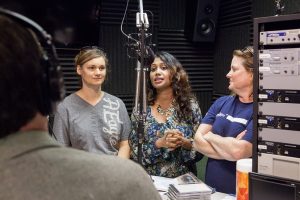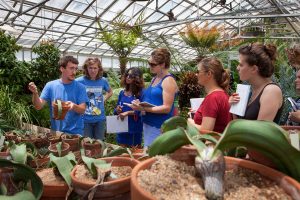Poetry Boot Camp

By: Cynthia Adams | Photos By: Nancy Evelyn
POETRY was on the minds of a disparate group of graduate students and educators arriving one June morning for the first day of Poetry Boot Camp in Athens. Camp would open with a day that was witheringly hot in the shade—and the creative stakes would increase along with the temperatures in the coming week.
The students had packed up their poetic devices, along with pen and paper in their rucksacks, and were about to get a move on, even as the Georgia heat did its worst. “Alliteration. Assonance. Consonance. Imagery. Language. Simile. Metaphor. Ma’am, yes, Ma’am!”
The band of willing writers—a mix of poetry rookies and well-versed veterans—fell in behind their leader, Melisa Cahnmann-Taylor, ready for hardcore creativity. She guides her poetry rookies with intensive training. The boot camp rookie enrollees quickly learned the drill: they were charged with intensive writing by night, then readings and what their word-crafting leader called “craft talks.” In civilian talk, that meant close examination of their writings, guided by the boot camp instructor, Cahnmann-Taylor.
It was what these writers had signed on for and if they regretted it, there was no sign whatsoever. The graduate students would write, present, critique, revise, and repeat. Ultimately they would read work publicly at a popular downtown venue. That culminating event was part of the third annual poetry series called Seat in the Shade. The Seat in the Shade series sponsored by the University of Georgia’s College of Education and hosted by Cahnmann-Taylor, featured five noted poets this past summer.
The grand finale of the series on June 26, titled “Poetry by and for Educators: Readings from the Collective,” would be the first time many of the students had read their poetry publicly. Cahnmann-Taylor explains that the experience of public reading “is to raise the stakes, and to help the revision process.” The collective reading featuring UGA educators and students from the Poetry Boot Camp was slated for Hendershots, an event-oriented Athens bar and coffee spot with a stage and a microphone. A videographer would film them and the reading would be posted online.
The days ahead would prove intense for the word crafters. To kick-start their writing, there would also be an experiential component. Boots-on-the-ground field trips included treks to the Classic Center, Hargrett Rare Books and Manuscript Library, and the Georgia Review, designed to invite the poetic muse to visit and inspire. Also in the course of the week, meetings with editors, booksellers, radio commentators, plant biologists, humanitarian workers, and special collections librarians were meant to awaken the creative impulse, inspiring new work as the boot camp heated up.
“Some misunderstand poetry to be an individual’s expression of private emotions (e.g., love poems to one’s girlfriend; rants about parents, etc.), but poetry that plaits itself with interdisciplinary knowledge is a rich and nourished soil capable to grow new ways of thinking about the self and the world,” Cahnmann-Taylor writes after the camp ends. “This is why I think it’s so important to have new poets practice both the craft of poetry as well as the craft of opening our eyes and minds to fields of knowledge that surround us in a university environment. Poetic field trips are the best excuse for us all to enter new worlds of knowing and see how the rich worlds of words and thinking in those fields can enlarge the ways we see our personal stories as well as the stories we tell as educators.”
Some misunderstand poetry to be an individual’s expression of private emotions…, but poetry that plaits itself with interdisciplinary knowledge is a rich and nourished soil capable to grow new ways of thinking about the self and the world.
-Melisa Cahnmann-Taylor
At boot camp, allowances and indulgences were made. (Food and creature comforts were considered. Snacks, coffee, and drinks appeared and lunch plans were deliberated.) “What do poets eat?” someone asks. The answers fly: “Coffee!” and, “Energy gummies!” and, “Chocolate!”
But boot camp did not tolerate one thing: flabby, inarticulate thoughts. “Poetry is for smart people,” Cahnmann-Taylor says, smiling widely. “Smart people like to accrue more words.” The poets and educators nod agreement—they brought an appetite for language that will not be sated by comfort foods in a Tupperware container or a zip-locking bag.
ILLUMINATING THE WORLD WITH POETIC CRAFT
If there is such a thing as a living poetry drill sergeant, Cahnmann-Taylor is that.
As a professor of Language and Literacy Education at the University of Georgia, she has led this workshop for the past three years in conjunction with the poetry series. (The workshop concept is based upon a California boot camp/ poetry experience, she explains.) She is a published poet with impressive prize credentials to her credit.
Cahnmann-Taylor, colorful and exotic in her dress, wears exuberantly colorful clothes and Mexican-inspired jewelry. In a literal sense, her uniform was poetic. Just returned from a year-long Fulbright experience in Oaxaca, Mexico, she greeted participants with spirited welcomes.
- Boots on the Ground: Camp participants enjoyed the chance to discuss poetry on WUGA campus radio and to find inspiration through a series of outings carrying them beyond their everyday experience.
“Poetry is the ideal home to exercise interdisciplinarity,” says Cahnmann-Taylor. “By this I mean that great poetry affords the ultimate collision between the self’s story and the world of words and knowledge outside the self. Take the field of astronomy, as poet Dorianne Laux does in her poem ‘Facts About the Moon.’ Opening the poem, as she does, with literal facts about the moon, allows her to harness the power of metaphor to speak of love’s pull, even in the gravest of circumstances. Take what Rita Dove knows from her life as an African-American woman. Intertwine Dove’s lived experience with a knowledge of world history, Black history in diaspora, the history of the Dominican Republic, and an understanding of poetic craft, and you get an illuminating poem such as ‘Parsley’ (be sure to read the poem’s footnote) that is a great work of art as well as a work of history.”
The first arrivals that summer’s day included a third grade teacher, Julie Carbaugh, who was entering a doctoral program in the fall. Amy Ingalls, who works with online courses on the UGA campus, was also early. Several of the class members were doctoral students; one has already earned a master’s in comparative literature. Allisa (Lisa) Abraham, a middle school English teacher, has taken frequent writing courses and workshops. Mounawar Abbouchi, a Lebanese student, is currently working on a master’s degree. Sonia Sharmin is a doctoral student from Bangladesh.
“Poetry,” Cahnmann-Taylor said as the class settled, “is about the measured word. And each and every word counting.” The silence was measured, too, as the students took stock.
“A poetry boot camp means you have to bring and read a poem, and after the reading, it means examination of the words on paper,” Cahnmann-Taylor says. She speaks as she advises others to write: in a measured way, deliberately, expressively, commanding the room.
From an oversized rattan chair, Cahnmann-Taylor asked the poetry recruits to begin reading their work aloud, but told them they could choose another student to read for them if they liked. The students reviewed their poems, their eyes brushing over the pages, before raising their eyes to read the faces of their fellow students.
The professor directed the student on the reader’s left on the protocol for critique. “Use the language of poetry craft in accessing and responding to the poem read.” This nonjudgmental, deliberative give-and-take was the start of an intensive two weeks exploring artistic craft. As poems are read, she advises them in the skills of exposition, delivery, and clarity. “You must teach your readers how to read you.”
Earning its name, at boot camp the students were urged to do more, stretch harder, in order to ply raw talent into firm abilities. In the language of a good-natured drill instructor, Cahnmann-Taylor nudged them with comments like, “you nailed it,” or, “ground the abstraction in real experience,” or, “you let go of the rope” as they critiqued one another’s works. She also nurtured their creative spirits with praise, proffered often and kindly.
The student’s poetic subjects were as varied as their own backgrounds; their voices were nervous but firm as they read the resulting work. What was common for them all was admiration for poets who had found their voices and an audience of readers.
WALKING IN THE FOOTSTEPS OF THE GREATS
The Pulitzer Prize-winning poet Mary Oliver wrote: “Tell me, what is it you plan to do/With your one wild and precious life?”
From the first day, one thing was clear. The band of educators intended to at least allocate a portion of their lives to becoming poets. After a day of reviewing and reading, they heard from a professional poet. The fledgling poets attended a reading by Tom Lux, endowed poet at Georgia Tech. His recent work, God Particles, has been highly praised by critics.
Lux took the stage and the filled room hushed. “The main responsibility of a writer is not to be boring—and that begins with the title.” He read a poem about hitting a cow with dirt balls, lobbing the lines. Lux’s subject matter was gritty and visceral, and the poet took an unflinching, deal-with-it stance.
Lux did not meet eyes as he read more work; his words grazed the walls, the ceiling, and found their mark. He left the stage like a prize fighter; head bowed. Some of the students were wide-eyed, others making furious notes. Lux, it appeared, was a game changer.
“The idea is to tell the truth, but you can change any facts you want,” he said sardonically during the reading. This, Lux presumably meant, is in literary service to the truth, and to the work of never being boring.
Cahnmann-Taylor clarified later, “We have changed the details of what ‘actually happened’ (e.g. what was literally ‘true’) to render a more finely crafted poem, as well as to render a human truth (with a capital ‘T’).”
Poetry is about the measured word. And each and every word counting. – Melisa Cahnmann-Taylor
By the next morning, there were fresh sheaves of student poetry ready for reading and scrutiny. Manila folders were opened and crisp white copies of poems distributed. Today, the reading grew more studious and things were taken up a notch. Lux seemed to have injected a new resolve, and more than a little graphic punch, within the poets.
Cahnmann-Taylor cocked her ear as students read poem after poem. She challenged them to “live in their obsessions, and the way they inform their poetry.” She urged them to “use the material they are living and obsessing over.”
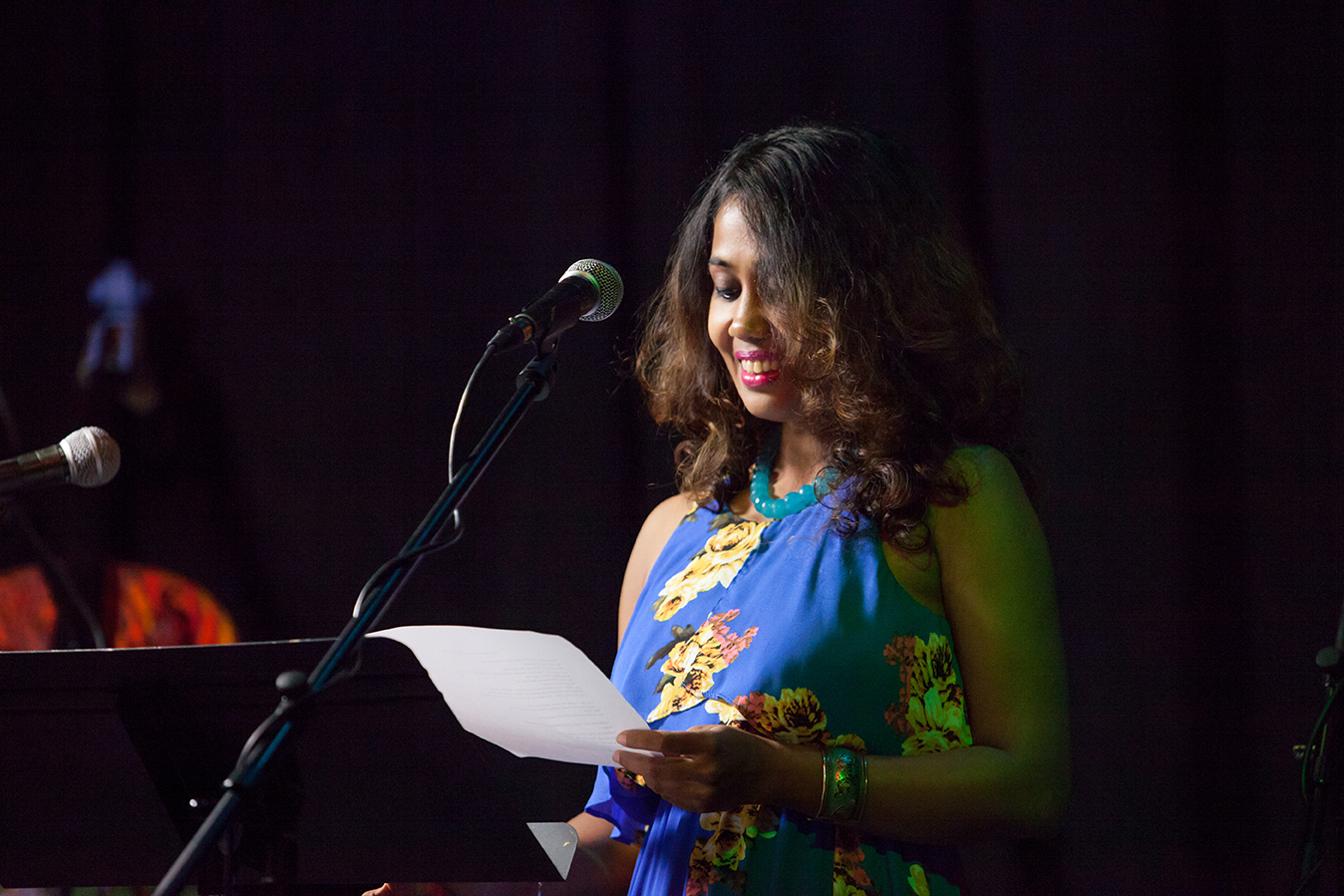
Sonia Sharmin
From the Poem: “Getting a PhD”
Getting a PhD stands for paranoia
—heartbeats like drums.
Getting a PhD is indecision, piles of paper
roaming around human subjects,
Getting a PhD is an accolade when the
naked body
is adorned, finally, with colorful attire
Ultimately, she says that “all poetry is about love and death. What else is there?”
Sharmin, who wears intensely saturated colors and jewelry, confessed to being obsessed with beauty. Cahnmann-Taylor requested she be specific. Sharmin faced the arduous task of writing poetry in a second language. She searched for specificity.
“Blue,” she amended. “The bluest eye….” Sharmin then stopped abruptly, apologetically. She paused. “The ocean blue.” Sharmin attempted to describe the colors of the ocean, of mountains, fabrics, and jewelry.

Poetry Bootcamp participant-Photo taken at Hendershots
Abraham confessed to an obsession with her newly purchased house. She described hardwood floors, claw foot tub, and a garden with rapturous descriptivism.
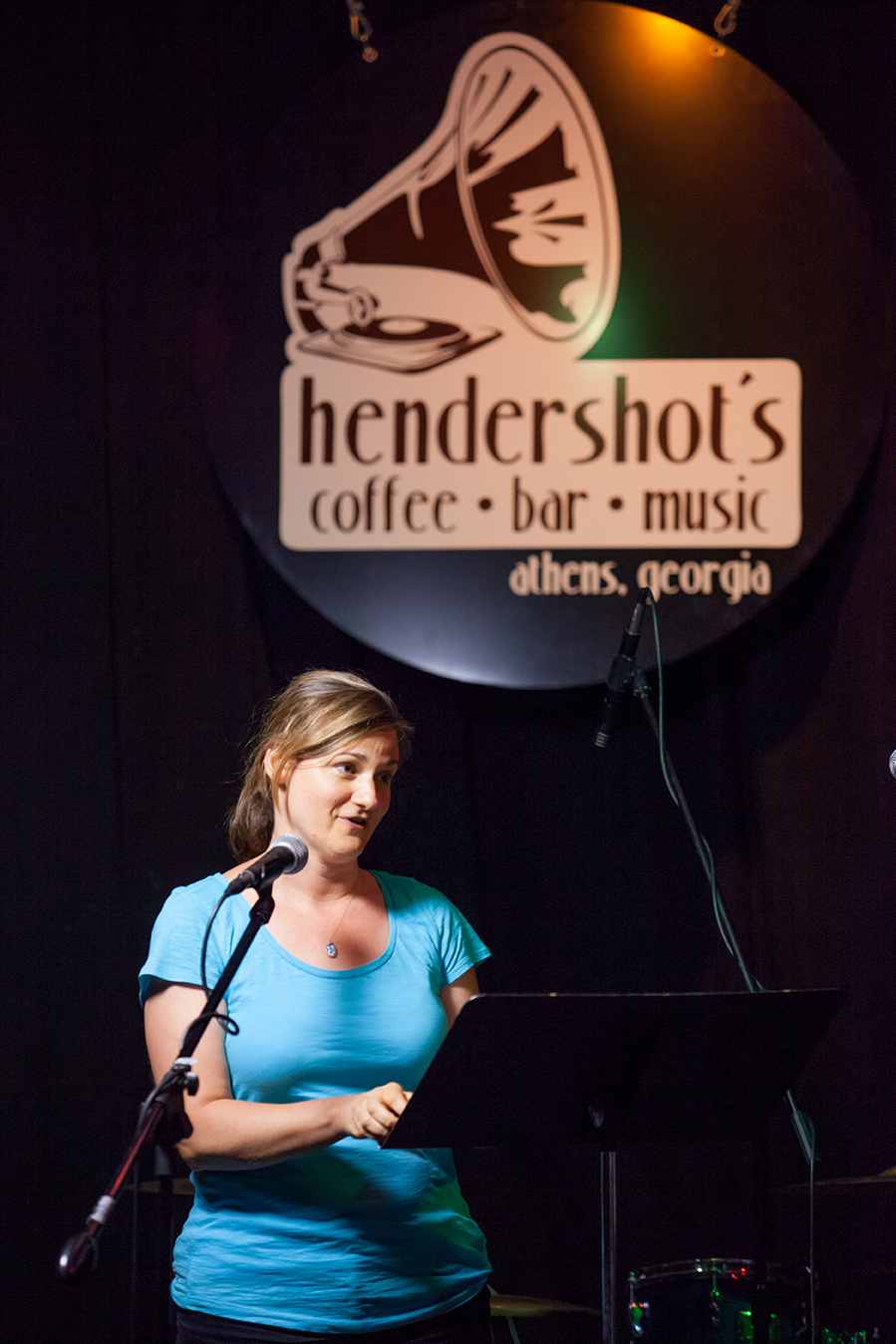
Julie Carbaugh
From the Poem: “Ode to the Mobile Classroom”
The white rectangle box that sings,
a rhythm of lullabies when it rains.
Whose shadow creatures make their
presence known, by showing up
in desks when you least expect.
Oh! to the tin can where learning
takes place, where students celebrate,
when the smell of dirty furniture,
stings eyes, curls toes.
Carbaugh admitted an obsession with decorating and arranging her classroom, and studying online design images on Pinterest. She laughed about teaching six years in a mobile unit. At this, her fellow students laughed with her when she used an old poetic device, the euphemism, calling the mobile unit “a learning cottage.”
Ingalls, however, is obsessed with sleep, as online instruction for the College of Education at UGA requires her to be available “24/7…even in the middle of the night,” she yawned.
Abbouchi explained how she had been obsessed with preparations for visiting guests from her home in Lebanon.
Here, the particulars of their lives not only mattered, but they were crucial to their work and gave it authenticity. “I want you to live in your obsessions,” Cahnmann-Taylor repeated.
Abbouchi writes a poem titled, “Papiro Flexia” about origami. Hers is a clean, crisp, repetitive poem, which the professor praises as “yum on the tongue.” The professor describes repetition in poetry, and the term villa nelle. She then describes a “pantoum” structure. A pantoum is normally comprised of four stanzas, and is structured with quatrains in which lines of each repeat as the poem continues.
“I like rhymes and slant rhymes,” the professor says. She introduces more structures and methodologies—tools the poets can use in their arsenal of devices. Cahnmann-Taylor reminds them that iambic pentameter mimics the human heart beat. When another poem is read, she cocks her head. “I hear the echo of a sonnet,” she says appreciatively.
There are online sites devoted to poetry and the craft of poetry writing, which Cahnmann-Taylor discusses with enthusiasm. The professor muses; poetry has moved into a new age of electronics. “Poets used to use hand-held rhyming dictionaries.” Now, their dictionaries are hand-held electronic devices. She tells them about a gloss—or glossary.
She warns: “Clichéd language in poetry means word pairings we want to be cautious of.”
At poetry boot camp, the students were challenged to contemplate the large and small themes of their lives, and to discover at least a part of the answer to Oliver’s question. As the professor has explained, “Every good poem has a chronology, biology, and culture.” She elaborates. “Chronology (as in, a sense of time) and geography (a sense of place) and furniture (as in plentiful, sensory details.)” Cahnmann-Taylor says, “This is a quote from my teacher, now passed.”
Boot camp was a place to get at the question of whether or not they, too, truly wanted to live a poet’s life. Poet Sandra Meek read from her work on the following evening. Meek is the author of four books of poems, and a winner of the Dorset Prize for her book, Biogeography. She read from recently published Road Scatter, which she said traced the period of her mother’s experience with lung cancer, chemotherapy and death. This work addressed sobering, graphic themes of loss and finality. Meek, though softer spoken than Lux, was equally fearless.
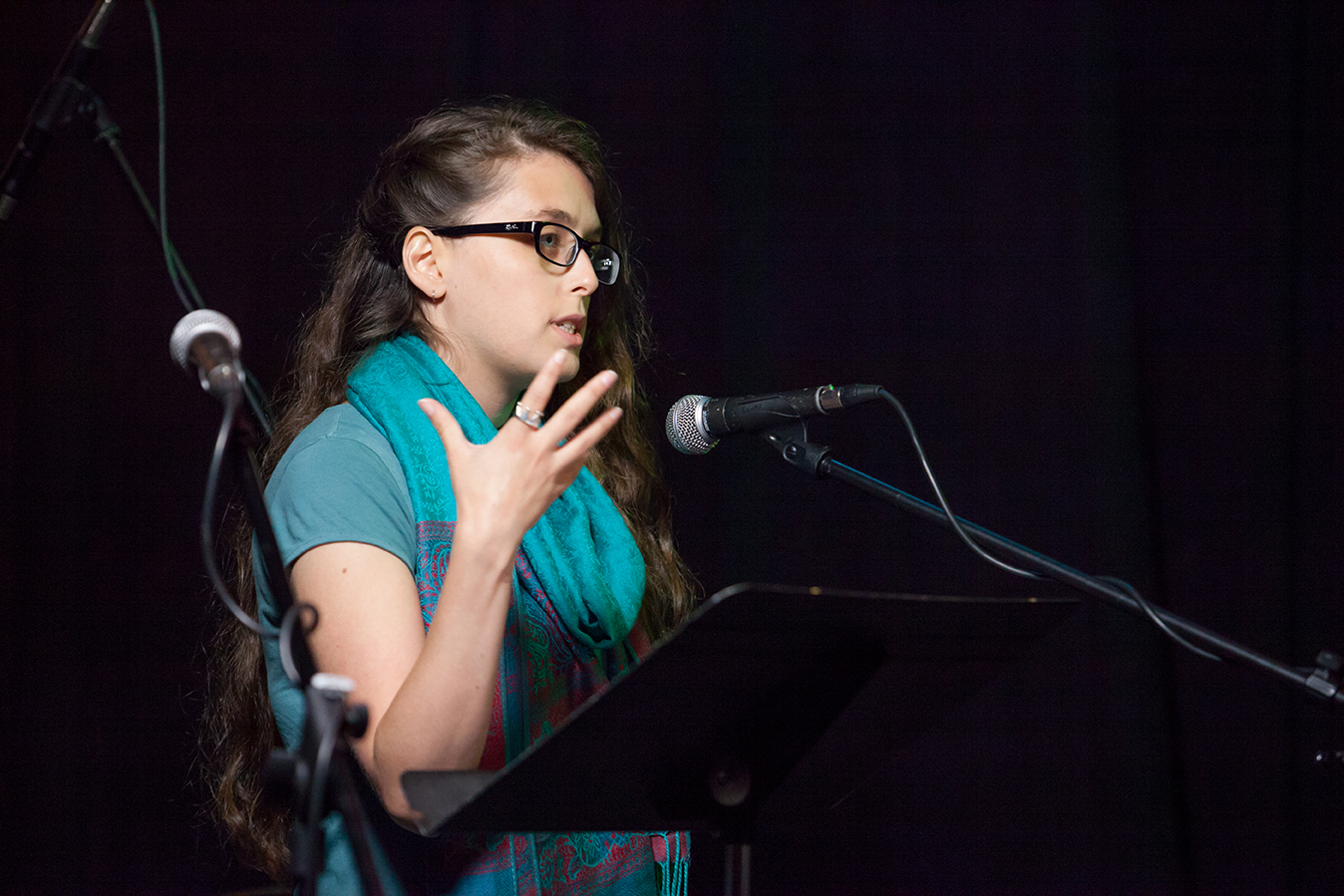
Mounawar Abbouchi
From the Poem “Papiro Flexia”
Paper friends last longer,
Or as long as the paper which we know,
From old books you can’t
Touch, is at least a thousand years.
The dragon whispers “Don’t be afraid.”
The cat yawns “Just relax.”
The crane tells me “Make a wish.”
There’s enough raw material to
populate the planet.
This says July 2013: a flyer-butterfly
for my sister.
This class I took three years ago: a
syllabus-box for my friend.
I won’t be returning to a receipt-flower
for my sweetheart.
Things would be cleaner, more solid,
If everything was made of paper.
AT LAST, A TURN IN THE SPOTLIGHT: “JUST SHOW UP AT THE DESK AND WRITE.”
On the evening of June 26, the class returns to Hendershots, where the poetry recruits moved up the ranks and became poets giving a public reading.
First up after their professor opens the event is Carbaugh, who reads an experimental sonnet, “A Teacher’s Summer.” Next is Abraham, who talks about being a 10th grade teacher as well as doctoral student. Her first poem is, “During a District Walk through Debriefing.” Ingalls, referencing Lux’s reading, reads her poem, “Thomas Lux Tells it Like it Is.” Sharmin reads “Newborn,” a poem she has repeatedly revised. Last on stage is Abbouchi, who begins with reading “Papiro Flexia.”
Each takes the microphone and has their moment in the spotlight. They demonstrate remarkable composure as they read—possibly the outcome of such intense preparation preceding that public moment.
“I also enjoy sharing a dose of stage fright with the students—that tension prior to a public performance can nourish us—it’s a kind of adrenaline rush! When this rush accompanies deep learning, then all the hard work, the early mornings and late evenings of hard work, feel well worth it,” Cahnmann-Taylor writes afterward. “We honor all that we’ve learned by sharing it with a small public. With a performance background, I do put some worry and planning into cocreating an event that will feel well-timed and entertaining; I coach students on how to perform the poem rather than mumble it; how to choose the strongest work and a strong order to the poems they read. ”
Cahnmann-Taylor reflected, “I am surprised each year by how students rise to the challenge, communicating so effectively with the audience. I am ecstatic to see audience members come up to the poets afterward and express their gratitude and converse with the students about their work. If my students feel the value and ‘kapow!’ of public community sharing as part of their coursework, then my hope is that they may seek to generate this feeling with their own students in their own classrooms.”
The students’ body language is telling as they depart the stage, faces wreathed with smiles. They have been anointed in the spotlight as literati and poets. The students are boot camp rookies no longer.
To watch the finale event for Seat in the Shade 2014, visit: www.youtube.com/user/UGACOE
Cahnmann-Taylor is a winner of Dorothy Sargent Rosenberg Poetry Prizes and a Leeway Poetry Grant. She has co-authored two books: Teachers Act Up! Creating Multicultural Learning Communities Through Theatre and Arts-Based Research in Education: Foundations for Practice.




